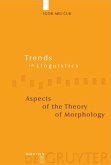This book proposes a new synthesis of the functions of proper names, from a semantic, pragmatic and syntactic perspective. Proper names are approached constructionally, distinguishing prototypical uses from more marked ones such as those in which names are used as common nouns. Since what is traditionally regarded as 'the' class of names turns out to be only one possible function of name-forms (though a prototypical one), the notion of 'proprial lemma' is introduced as the concept behind both proprial and appellative uses of such categories as place names and personal names. New formal arguments are adduced to distinguish proper name function from common noun or pronoun function.
The special status of proper names is captured in a unified pragmatic-semantic-syntactic theory: a proper name denotes a unique entity at the level of langue to make it psychosocially salient within a given basic level category. The meaning of the name, if any, does not determine its denotation. An important formal reflection of this characterization of names is their ability to appear in such close appositional constructions as the poet Burns or Fido the dog. The neurolinguistic finding that proper names constitute a separate category is introduced and interpreted within a general linguistic frame of reference. The different kinds of meanings associated with names (categorical, associative, emotive, and grammatical) are shown to be presuppositional in nature. In addition, the book proposes an entirely new classification of proper names as forming a continuum ranging from prototypical (personal and place names) to nonprototypical categories (brand and language names) to citations and autonyms, and a new diachronic classification of family names and nicknames.
This book fills an important gap in the current literature, because the most recent linguistic book in English on name theory dates back to 1973. It is explicitly interdisciplinary, taking into account linguistic, philosophical, neurolinguistic, sociolinguistic and dialect geographical aspects of proper names.
Hinweis: Dieser Artikel kann nur an eine deutsche Lieferadresse ausgeliefert werden.
The special status of proper names is captured in a unified pragmatic-semantic-syntactic theory: a proper name denotes a unique entity at the level of langue to make it psychosocially salient within a given basic level category. The meaning of the name, if any, does not determine its denotation. An important formal reflection of this characterization of names is their ability to appear in such close appositional constructions as the poet Burns or Fido the dog. The neurolinguistic finding that proper names constitute a separate category is introduced and interpreted within a general linguistic frame of reference. The different kinds of meanings associated with names (categorical, associative, emotive, and grammatical) are shown to be presuppositional in nature. In addition, the book proposes an entirely new classification of proper names as forming a continuum ranging from prototypical (personal and place names) to nonprototypical categories (brand and language names) to citations and autonyms, and a new diachronic classification of family names and nicknames.
This book fills an important gap in the current literature, because the most recent linguistic book in English on name theory dates back to 1973. It is explicitly interdisciplinary, taking into account linguistic, philosophical, neurolinguistic, sociolinguistic and dialect geographical aspects of proper names.
Hinweis: Dieser Artikel kann nur an eine deutsche Lieferadresse ausgeliefert werden.
"Dieses Buch ist ein Markstein in der Geschichte der Namentheorie."Volker Kohlheim in: Beiträge zur Namenforschung 3/2008 "Das Werk stellt einen Meilenstein linguistisch-onomastischer Forschung dar, informativ und mit neuen diskussionswürdigen Ansätzen."Friedhelm Debus in: Germanistik 1-2/2007
"Dieses Buch ist ein Markstein in der Geschichte der Namentheorie."
Volker Kohlheim in: Beiträge zur Namenforschung 3/2008
"Das Werk stellt einen Meilenstein linguistisch-onomastischer Forschung dar, informativ und mit neuen diskussionswürdigen Ansätzen."
Friedhelm Debus in: Germanistik 1-2/2007
"Dieses Buch ist ein Markstein in der Geschichte der Namentheorie."
Volker Kohlheim in: Beiträge zur Namenforschung 3/2008
"Das Werk stellt einen Meilenstein linguistisch-onomastischer Forschung dar, informativ und mit neuen diskussionswürdigen Ansätzen."
Friedhelm Debus in: Germanistik 1-2/2007








